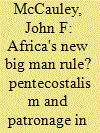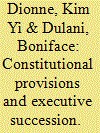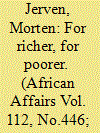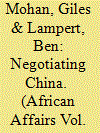|
|
|
Sort Order |
|
|
|
Items / Page
|
|
|
|
|
|
|
| Srl | Item |
| 1 |
ID:
118961


|
|
|
|
|
| Publication |
2013.
|
| Summary/Abstract |
The concept of 'big man rule', conventionally invoked to refer to a kinship-based relationship between patron and client, is now finding application in the charismatic Pentecostal movement in Africa. This article explores why new Pentecostalism emerges as an alternative to traditional clientelism, and how well the analogy of big man rule applies. It traces the Pentecostal form of big man rule to four socio-economic transformations: ongoing weakness in the state's ability to provide social welfare; a change in social values in the wake of the global financial crisis; expanding state control over customary activities; and urbanization. Drawing on data collected from both patrons and clients in Ghana, the article shows that Pentecostalism mirrors traditional big man rule by encouraging members to break from their past, to trust leadership, and to commit exclusively to their religious social network. Among church leaders, Pentecostalism also encourages internal competition and the provision of social services. Most importantly, the movement creates pay-off structures that replicate the exchange of resources for loyalty central to big man rule. The implication is that Pentecostalism's success as an alternative informal institution is not a function of Weberian ethics or occult spiritualities, but rather its ability to fill voids left by the state and to provide new social networks.
|
|
|
|
|
|
|
|
|
|
|
|
|
|
|
|
| 2 |
ID:
118966


|
|
|
|
|
| Publication |
2013.
|
| Summary/Abstract |
Four African leaders died in 2012. This article explores the constellation of factors that together led to a constitutional succession after President Bingu wa Mutharika's death in Malawi, despite plotting by the late President's allies to circumvent the constitution and install their own candidate over Vice-President Joyce Banda. We present data on executive deaths in office since 1961 and executive transfers of power 2010-12 in order to situate the Malawi transition within the broader African context, and draw especially on comparisons to executive successions that followed the death-in-office of presidents in Nigeria (2010) and Zambia (2008). We assert from these cases that constitutional provisions on executive succession are necessary in precipitating peaceful transitions, but also argue that periods of delay indicate that such provisions are insufficient on their own. We contend that presidential death is more likely to lead to transition than presidential incapacity. The Malawian case in particular illustrates how a constitutional transition requires support from key actors, particularly the Cabinet, military leaders, judiciary, civil society, and the independent media. Public rejection of military or authoritarian rule, and the growing precedent for constitutional succession in Africa, are additional drivers of peaceful transitions.
|
|
|
|
|
|
|
|
|
|
|
|
|
|
|
|
| 3 |
ID:
118967


|
|
|
|
|
| Publication |
2013.
|
| Summary/Abstract |
ON 5 NOVEMBER 2010, GHANA STATISTICAL SERVICES announced that it was revising the GDP estimates upwards by over 60 percent, suggesting that in previous GDP estimates economic activities worth about US$13 billion had been missed. After the revision a range of new activities were accounted for, and as a result Ghana was suddenly upgraded from a low-income country to a lower-middle-income country. In the fall of 2011 Nigeria also announced a forthcoming upward revision of its GDP. Without presenting the public with any facts or figures, nor a date for the revision, it was announced by the director of the Nigerian Bureau of Statistics that Nigeria soon would join Ghana in escaping poverty according to official statistics.
|
|
|
|
|
|
|
|
|
|
|
|
|
|
|
|
| 4 |
ID:
118964


|
|
|
|
|
| Publication |
2013.
|
| Summary/Abstract |
At first glance, Burundi represents a successful negotiated transition to peaceful governance through power sharing, and a justification for regional and international peacebuilders' involvement. It is undeniable that Burundi is safer than it was a decade or two ago. Most notably, while Burundi was once known for its ethnic divisions and antagonism, today ethnicity is no longer the most salient feature around which conflict is generated. Nevertheless, this article argues that the Burundian experience illuminates international peacebuilding contradictions. Peacebuilding in Burundi highlights the complex interplay between outside ideas and interests, and multiple Burundian ideas and interests. This is illustrated by the negotiation and implementation of governance institutions and practices in Burundi. Outsiders promoted governance ideas that were in line with their favoured conception of peacebuilding, and Burundian politicians renegotiated and reinterpreted these institutions and practices. Even as international rhetoric about peacebuilding emphasized liberal governance and inclusive participation, narrower conceptions of peacebuilding as stabilization and control became dominant. Thus, encounters between international, regional, and local actors have produced governance arrangements that are at odds with their liberal and inclusionary rhetorics. Paradoxically, the activities of international peacebuilders have contributed to an 'order' in Burundi where violence, coercion, and militarism remain central.
|
|
|
|
|
|
|
|
|
|
|
|
|
|
|
|
| 5 |
ID:
118965


|
|
|
|
|
| Publication |
2013.
|
| Summary/Abstract |
Most analyses of China's renewed engagement with Africa treat China as the driving force, and little recognition is given to the role of African agency, especially beyond the level of state elites. This article investigates the extent of African agency in engagements with China and argues that at various levels African actors have negotiated, shaped, and even driven Chinese engagements in important ways. Suggesting a theoretical framework that captures agency both within and beyond the state, the article provides an empirical analysis of African agency first by showing how elements of the Angolan state created a hybrid set of institutions to broker Chinese investment projects, and second by discussing how African social actors have influenced and derived benefits from the activities of Chinese migrants in Ghana and Nigeria. While both cases demonstrate African agency, the ability of African actors to exercise such agency is highly uneven, placing African politics at the heart of any understanding of China-Africa relations.
|
|
|
|
|
|
|
|
|
|
|
|
|
|
|
|
| 6 |
ID:
118963


|
|
|
|
|
| Publication |
2013.
|
| Summary/Abstract |
Following the elections of 2007, there was a significant increase in public expressions of secessionist feeling on the Kenya coast. During 2010 and 2011, one manifestation of this was the emergence of the Mombasa Republic Council (MRC), which demands independence for the coastal region. The language of secessionism is historical, and revisits the vivid political debates of the late 1950s and early 1960s, when politics in coastal Kenya revolved successively around two constitutional issues. The first was the possibility that the Ten-Mile Strip, nominally the sovereign territory of the Sultan of Zanzibar, might not become a part of independent Kenya; the second was the 'regionalist' constitution of 1963-4. This article explores the way that people now retell the history of earlier debates, and argues that these retellings suggest both the power and the plasticity of claims to historical knowledge, and that they reveal a profound fault line within 'secessionist' opinion, which separates those who claim political primacy on the basis of autochthony from those who locate their claim to independence in the language of colonial-era treaties. Such divisions are important, because they shape the way that secessionist arguments are framed, and the potential for secessionist politics to undermine the unity of the Kenyan state.
|
|
|
|
|
|
|
|
|
|
|
|
|
|
|
|
| 7 |
ID:
118962


|
|
|
|
|
| Publication |
2013.
|
| Summary/Abstract |
Witchcraft has been documented across the globe. The widespread occurrence of such beliefs in modern Africa affects politics, economic development, and poverty alleviation. Anthropologists have analysed the semiotics of African witchcraft, but there is less information on distributional issues. An important question is which communities are most affected, and why? Using data from a survey of 182 villages and 2,443 household heads in the Gola Forest region of eastern Sierra Leone, we examine three manifestations of witchcraft - concerns, conflicts, and detection. We find that where patrimonial relations of agrarian production remain strong, and in settings where market forces are now well established, witchcraft is less of a concern. By contrast, witchcraft manifestations are higher in communities experiencing the competing pull of patrimonial and market norms. Witchcraft, we conclude, is a product of normative ambiguity.
|
|
|
|
|
|
|
|
|
|
|
|
|
|
|
|
|
|
|
|
|